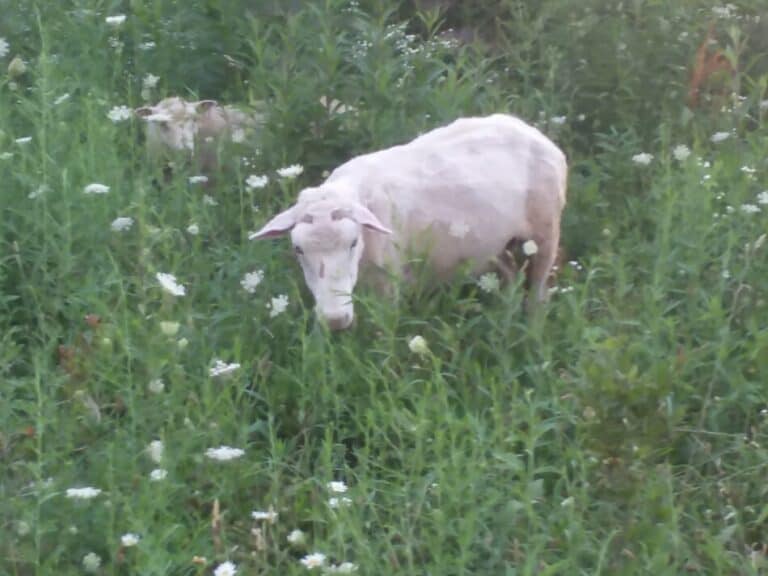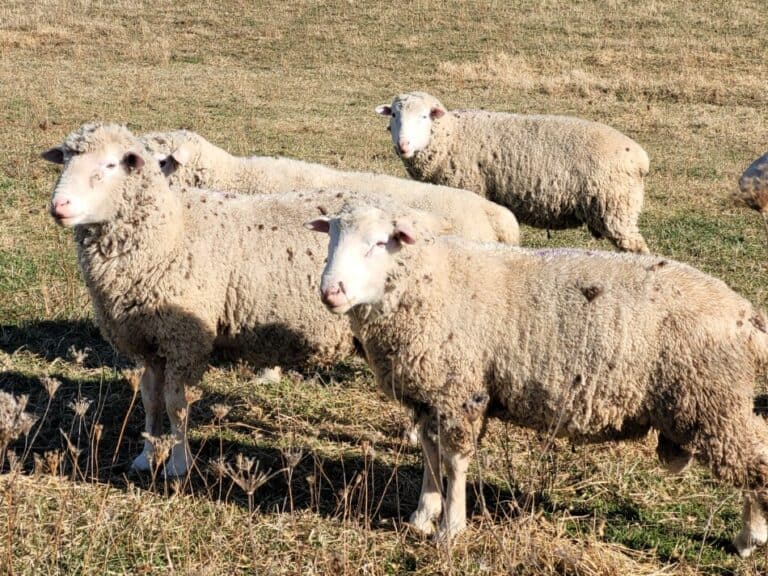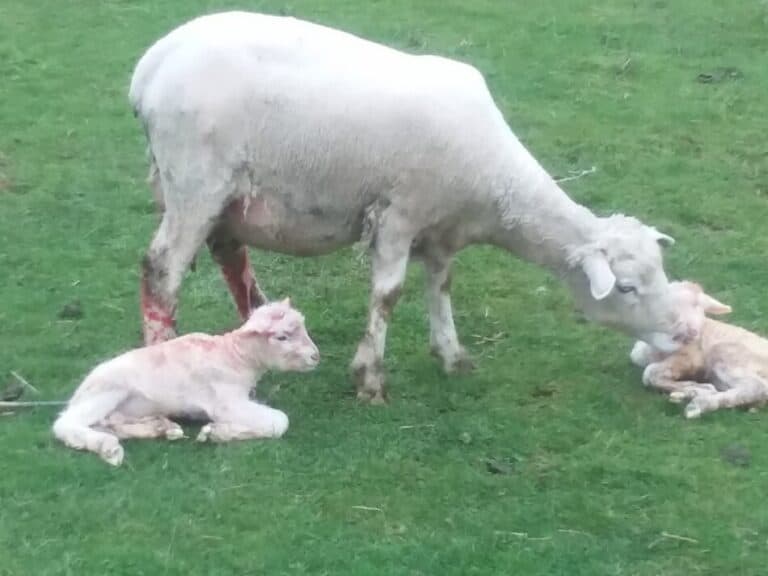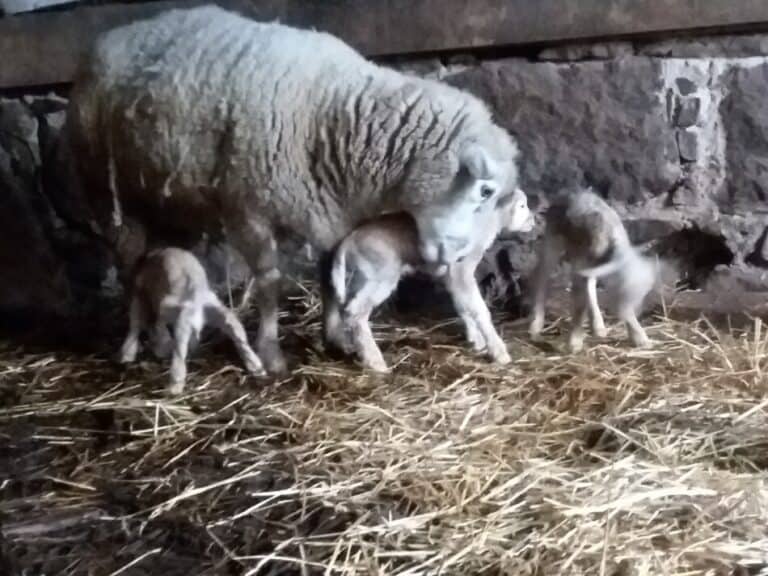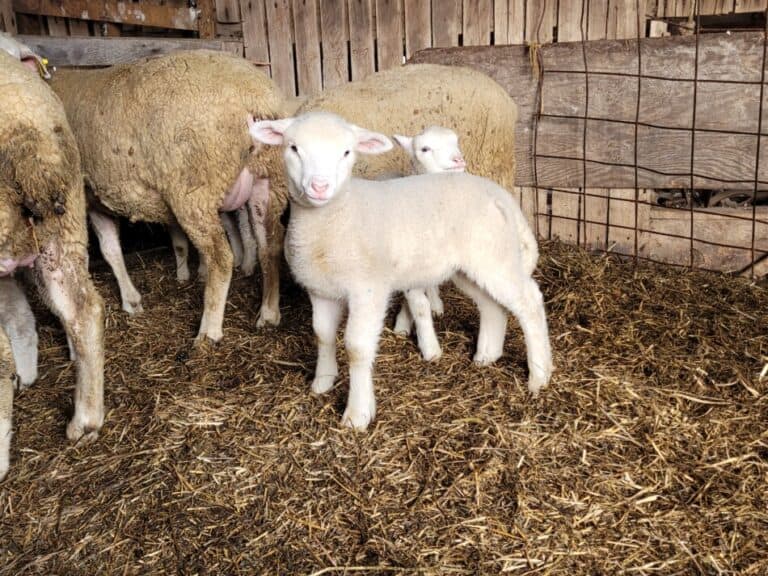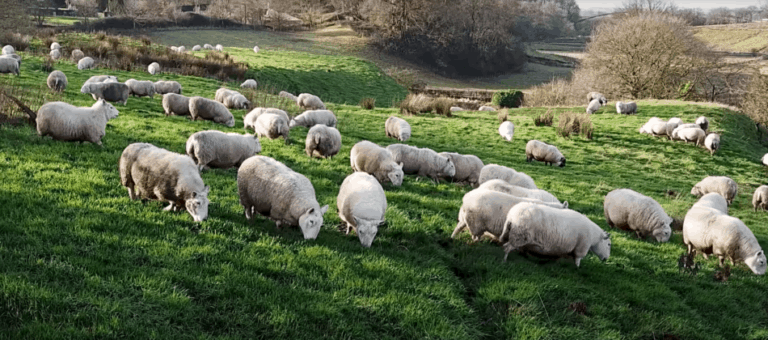What Can Sheep Eat Other Than Grass? 6 Options
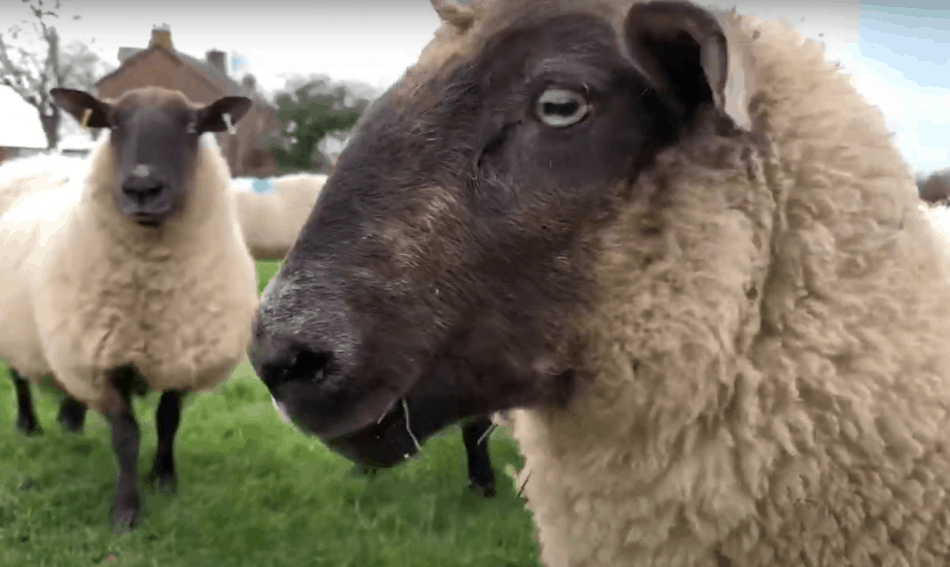
We know sheep love to eat grass in the summer! But… sometimes you need to feed your sheep something else, like during the winter when the grass stops growing. What can sheep eat besides grass?
Sheep can eat many foods in addition to grass, including hay or haylage, some vegetables, bark of small trees and shrubs, many weeds, pelleted feeds and grains.
How Many Bales Of Hay Do Sheep Need? is an article I wrote that will help you figure up your non growing season hay needs for your flock.
Sheep can eat hay or haylage
The most common feed for sheep when they are not eating grass is hay, which is dried grass or other forages, or haylage, which is fermented grass or other sheep friendly forages. (A forage is a plant grow for feeding to livestock.)
Many plants can be made into sheep hay
There are many different kind of hays, varying by which plant or plants they are made of and when the hay was cut in the growing season, which will affect the nutrition available to the sheep when she eats it.
Common plants used for hay are orchard grass, timothy, alfalfa and clover. There are many more plants used for hay, this is just a small list of plants common in my area, Ohio.
Common terminology with hay is the word cutting, which simply means from which cutting, 1st, 2nd, etc. did this hay come from.
Breeds Of Sheep For Beginners gives you our top picks of easy to work with sheep breeds perfect for beginners!
Well made, later cuttings are usually higher quality sheep hay
Usually the later cuttings are more sheep friendly than first cutting hay. This is only because first cutting is hard to get made on time (at the perfect plant maturity and nutrient level) compared to the other cuttings.
A well made first cutting is a wonderful hay, great for sheep. A late made first cutting is a poor hay, not suitable for any sheep.
If you are feeding high energy needs sheep, like growing lambs or lactating ewes, you’ll need to give them a nicer hay, when grass is not available, while maintenance sheep will be fine on a high quality first cutting instead of grass.
Sheep enjoy eating some common vegetables
Sheep like vegetables, especially leafy greens, root vegetables and winter squash and pumpkins.
For guidance here on which vegetables are fine for sheep, think about the family that the vegetable came from and if there is a plant grown for livestock from that family of plants.
For example: sheep love all manner of brassicas, like cabbage. It is used to be very common to grow turnips or rape (which is also called canola, a leafy loose cabbage type forage) for sheep to eat, both of which are brassicas.
Sheep love winter squash and pumpkins
Sheep enjoy eating winter squash and pumpkins. They may need some help getting started with the pumpkin, some will just bite in on the side for other sheep you’ll need to break the pumpkin open for the sheep to start eating it.
Our sheep ignored some small pumpkins we had put in their pasture, until they discovered a broken one and started eating right away.
If you have young sheep, they’ve never had another sheep show them how to eat a pumpkin. If yours are slow on the uptake, cut or break the pumpkin and see if that makes a difference to them.
Our sheep will bite the outer edge of the beet root, once they have eaten the greens. For some reason, they prefer the greens first, then after thinking about it, and making sure there are no more greens, will go back and eat the beet root.
We don’t normally consider these type of foods as livestock feed, but before grain was available, growing winter fodder, including root vegetables or pumpkins was common place.
Sheep eat tender growth and bark of shrubs and trees
Your sheep will eat the more tender growth on shrubs and trees. This shrubby growth may not be enough for them to go without hay or grass, but give it a shot and see how your flock does.
If you have some wooded areas starting to get out of control, you can try putting the sheep in the area and seeing what they will eat.
Be warned, if you leave the sheep in place around trees or shrubs that you do not want eaten, the sheep will start to nibble on the bark and growing points when they get tired of the grass in that area.
Will Sheep Eat Fruit Trees? gives you an idea of when it is safe to have your sheep around trees and when it is not!
Keep sheep moving past trees and shrubs you want to keep
Keep your sheep moving along if you don’t want them eating your favorite shrubs or stripping the bark off of your shade trees!
I have read that eating the bark is a sign that the sheep are missing something from their diet in the winter. Maybe so, but our sheep strip bark and eat growing points no matter the time of year, they must just taste good!
There is a business that does just this, Cud Crew, is a sheep grazing for hire business out of Georgia that specializes in having sheep eat unwanted or overgrown vegetation. This includes encroachment of trees and shrubs.
If the flock at Cud Crew can clear out overgrown brush, your sheep can do it too!
Many weeds are eagerly eaten by sheep
Many weeds are eagerly eaten by your flock! I get a huge kick out of the word “weed”. To me, there really is no such thing since the sheep will eat nearly anything that most folks call weeds.
If the sheep are eating it, it’s not a weed! It’s a forage
If the sheep are eating it, then it’s not a weed, it’s a forage plant full of nutrients that the sheep need.
“Weeds” like dandelions, thistle, lamb’s quarter, pig weed, quack grass, foxtail and many others. Give your sheep a chance to eat that weedy spot before you mow it down, you’ll be surprised how much use they get out of it!
If you have weeds that the sheep are not eating, but you want rid of, mow them off multiple times in the growing season. Most weeds hate to be mowed! Please, do not spray, just mow and see what you can accomplish.
Since not all weeds are safe for your flock, here is a list of poisonous weeds for livestock, be sure to look this over so you know what your sheep are getting into.
Sheep love to eat pelleted feeds
If you have taken a stroll through your local feed store lately, you’ll see all manner of pelleted feeds. Sheep love all of this kind of stuff.
There are different types of pelleted feeds
Be sure you read the label, so you know what you are getting when you buy a pelleted feed. Some feeds are a complete feed, meaning they provide all of the daily protein, vitamins and minerals for your sheep when fed with hay.
Some pellets are just hay. Nothing wrong with that, as long as you realize which one is which and feed accordingly. This will be very clear on the bag.
Pelleted feeds are fast and easy and greatly reduce refusal or sorting through the feed for the “good” pieces and leaving the rest. Since the pellet is all mixed together, there is no sorting.
Pelleted feeds tend to be a pricey sheep feed
The down side of pelleted feed is that pellets are usually more expensive than other forms of feed for your animals.
You’ll have to decide the worth of pelleted feed convenience vs cost per pound for your sheep and determine if pellets are worth it to you.
For us, we are commercial sheep farmers for a living, we never use pellets. They are too much money per pound for the feed, compared to using a whole or cracked grain or nicer hay. The idea of pellets is fine, it’s just the price tag.
Sheep do not need grain, but they do like it
You can feed your sheep grain. Sheep must have roughage, like hay or grass, as well!
We feed grain to weaned lambs, to help them put on the growth and finish needed to sell at the auction. We do not have the land to support the flock, so feeding a bit of grain fixes this gap.
Sheep love grain and will quickly learn that the sound of your bucket rattling around or the feed bag crinkling means snacks are coming.
Limit the grain available to your sheep
Know that sheep can and will overeat grain, they must be limit fed. Limit feeding means you give them only what they are to eat now, no full feeders to eat whenever or some will pig out and die. Start small and increase grain slowly.
Bucket trained sheep will come to grain
We find one of the biggest advantages of feeding grain, once again-a small amount per sheep, is super, bucket training! This is when the sheep see the bucket and run over, hoping for snacks.
Not a big deal on a normal day, but if the sheep are out or need moved, having them bucket trained with a bit of grain is a sanity and stress saver.
As mentioned above, sheep do not need grain, at all, ever. Sheep, like all other ruminants, can live just fine on forages only.
However, I know, at least for us, sometimes using a small amount of grain for the sheep will boost the energy available to the flock without breaking the bank type expenses.
I would prefer to only feed forages, but this is a business decision and grain gives sheep extra calories for little money.
Photo credit: image of black faced sheep is from The Sheep Game (YouTube)
